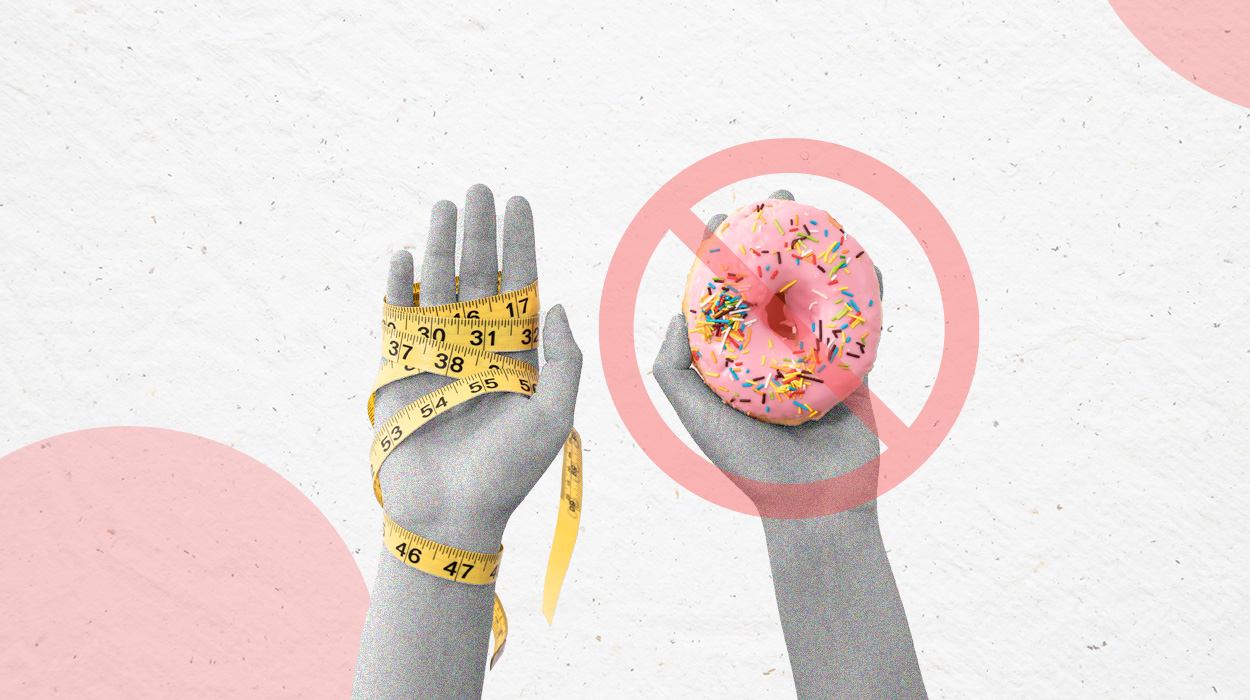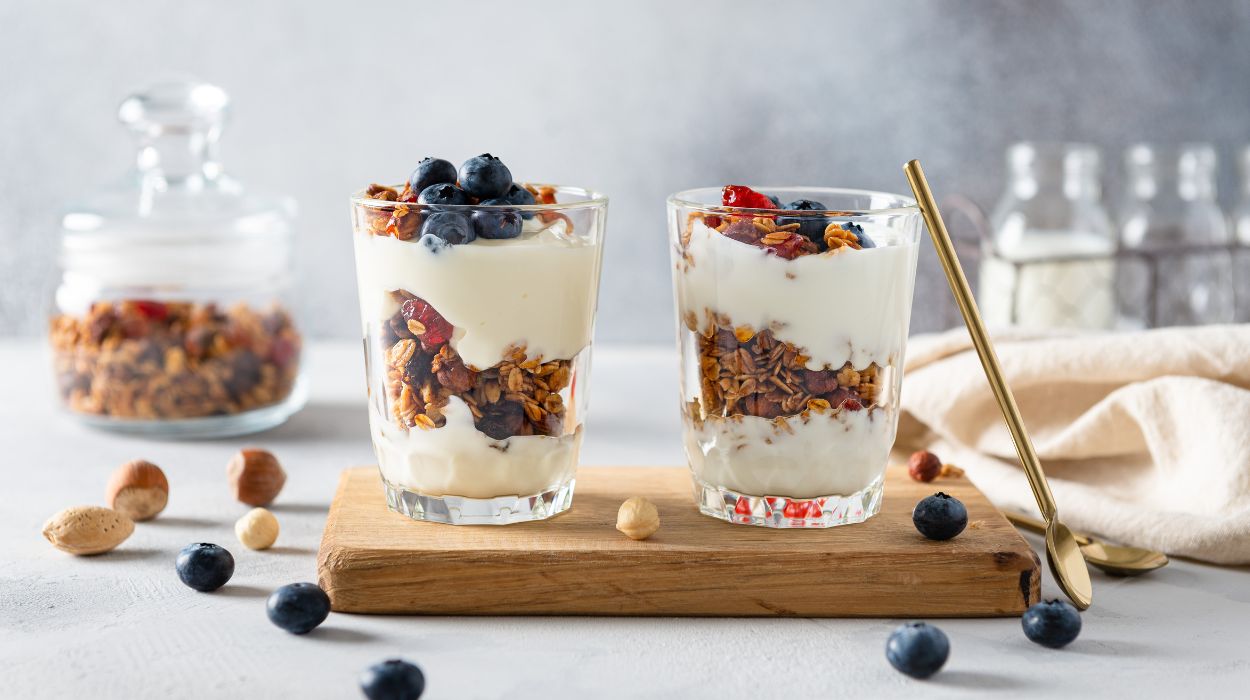 Expert's opinion
Expert's opinion
Expert's opinion
The article is a subjective view on this topic written by writers specializing in medical writing.
It may reflect on a personal journey surrounding struggles with an illness or medical condition, involve product comparisons, diet considerations, or other health-related opinions.
Although the view is entirely that of the writer, it is based on academic experiences and scientific research they have conducted; it is fact-checked by a team of degreed medical experts, and validated by sources attached to the article.
The numbers in parenthesis (1,2,3) will take you to clickable links to related scientific papers.
No Sugar For 2 Weeks Weight Loss – How Much Weight Can You Lose 2024?

There are many reasons that you should cut sugar out of your diet, and weight loss is only one of them. However, sugar is highly addictive and can be challenging to quit, while losing weight can be stressful. “No sugar for two weeks for weight loss” might be the key way to kicking the sugar habit and living a happier, healthier life. Read on to learn the reasons why you should cut out sugar and how to experience two weeks without sugar for weight loss.
How Much Weight Can You Lose By Cutting Out Sugar?
How much weight you could lose by eating no sugar for two weeks to lose an optimum amount of weight depends on several factors, including overall total diet, exercise habits, and personal lifestyle. If you follow a typical Western diet high in sugar, get little-to-no exercise, and live a high-stress sedentary lifestyle, you could expect dramatic results if you quit sugar for two weeks.
How To Cut Sugar Out Of Your Diet
If your body is used to eating a high-sugar diet, kicking the habit can be challenging. Here are four steps to follow every day for better nutrition.
Eat More Of These Foods
Try to consume more lean protein (eggs, fish, seeds, and nuts) and high-fiber, non-starchy vegetables (broccoli, asparagus, mushrooms, peppers, and onions) with every meal.
Complex carbohydrates such as brown rice and whole grains can be a good source of energy and fiber but consume these in moderation. Find a more in-depth guide to carbohydrates here.
When you need a snack, and you are craving something sweet, opt for fresh fruits such as berries, apples, or grapefruit. Natural sugar will satisfy your craving, and the vitamins and minerals will keep you healthy.
Increase Activity
If you want to lose weight, you must do more than remove sugar from your diet. You must increase your activity level and get your heart and lungs working.
The good news is that you don’t have to do a bunch of high-intensity exercises to lose weight. It can be as easy as walking 10-15 minutes a day. The key is consistency and effort. Walk briskly, swinging your arms and taking in deep breaths as you go.
If you want a fun, low-impact challenge, start with something like a simple plank challenge.
Drink More Water
Want to beat the sugar cravings, lose weight, and have overall better health? Drink more water.
It’s that simple.
Your body is made up of mostly water, so to keep it healthy and functioning well, it needs water.
If you want to give your water some low-calorie flavor, add some fresh fruit like berries, cucumbers, and sprigs of mint.
Restrict Access To Sweets
This may seem obvious, but it’s best to say it outright. If you want to cut out sugar, you need to make your living space a sugar-free zone.
You can’t be tempted by high-sugar snacks, ice cream, and sugary fruit drinks if you don’t buy them in the first place.
Replace food high in sugar with food high in fiber, such as vegetables, whole-grain bread, and brown rice.
Factors Affecting Your Sugar-Free Diet Plan
Weight gain is typically caused by consuming too many calories and not getting enough exercise. So to reverse that weight gain and improve your health, you’ll need to assess and plan around the following areas.
Your Current Diet
If you eat many sugary and processed foods, cutting back will serve you well. Many processed foods are high in sugars (and calories!) and low in the many nutrients that your body needs to function optimally and at its highest metabolic rate.
Take note of the foods you purchase and eat regularly. If you are eating out a lot, there is a good chance you are consuming too many hidden calories and too much-added sugar.
Your Current Level Of Activity
Working a sedentary job is a common culprit for weight gain. Add to this factors such as a long commute or a busy, irregular lifestyle, and you may be at the lowest level of physical activity.
A sedentary [1] lifestyle can cause many other health problems besides weight gain. It can be a leading risk factor for diabetes, heart disease, anxiety, and depression.
Other Lifestyle Factors
Other lifestyle factors affecting weight gain and overall health include stress and preexisting health conditions.
If you experience a high-stress level daily, you are more prone to emotional eating and poor dietary choices.
Consuming alcohol and other drugs can cause weight gain and chronic health problems.
What Happens When You Stop Eating Sugar?
Aside from fighting unwanted weight gain, there are several great reasons to quit sugar. A reduced intake of sugar may lead to:
Glowing Skin
A diet high in processed foods and refined sugar results in a poor complexion. Acne [2] and inflammation can be cleared up dramatically by reducing sugar intake and drinking more water.

Decreased Risk Of Depression
Studies [3] have shown that overeating sugar can increase the risk of depression, especially in women.
However, when you decide to cut sugar from your diet, you must know you may experience signs of sugar withdrawal or detoxification. The most common symptoms[4] of sugar withdrawal are headaches, mood swings, and shakiness.
Decreased Risk Of Diseases
A diet high in sugar has been linked to an increased risk of specific health problems [5] such as:
- Cardiovascular disease.
- Cognitive problems, including dementia and Alzheimer’s.
- Colon cancer.
- Diabetes.
- High blood pressure, cholesterol, and triglyceride levels.
- Kidney disease.
- Liver disease.
- Obesity.
- Pancreatic cancer.
- Retina, muscle, and nerve damage.
- Behavioral problems in children.
Getting Rid Of Sugar In Your Diet
It’s no secret that most of us eat too much-added sugar daily. According to the Dietary Guidelines for Americans, we should be getting less than 10% [6] of our total calorie intake from sugar.
That is about 200 calories per day for someone following a 2,000-calorie-per-day diet.
Cutting out items like candy and soda isn’t enough. Neither is skipping dessert.
Added sugars are hidden in many foods that we think of as healthy. The problem is in finding the biggest hidden offenders and cutting them out.
Foods To Avoid
You already know that your favorite coffee from Starbucks is a sugar bomb. You also know to skip the ice cream.
But did you know that the seemingly healthy fruit and yogurt parfait from McDonald’s has a bit of sugar?

Here are some other sources of added sugar:
- Granola and trail mix.
- Nut butter.
- Smoothies and fruit bowls.
- Dressings, dips, and sauces.
Sneaky Sugar Culprits
While you should always read the label, sugar can go by many names [7]. Here are some words to watch out for when you’re checking labels:
- Dextrose.
- Fructose.
- Lactose.
- Table sugar.
- Beet sugar.
- Honey.
- Corn syrup.
- Turbinado.
- Agave.
- Sucrose.
- Glucose.
- High-fructose corn syrup.
Remember, just because it isn’t called sugar doesn’t mean it’s good for you.
Conclusion
How much weight you can lose by reducing sugar consumption depends on several factors, including overall total diet, exercise habits, and lifestyle choices. You could safely lose up to 2 pounds per week with proper diet and exercise. But the real benefits of lowering your sugar intake may come from healthy skin and decreased risk of depression and certain chronic lifestyle-related diseases. In addition, you should always consult your physician and registered dietitian before beginning any diet or exercise program.
+ 7 sources
Health Canal avoids using tertiary references. We have strict sourcing guidelines and rely on peer-reviewed studies, academic researches from medical associations and institutions. To ensure the accuracy of articles in Health Canal, you can read more about the editorial process here
- Jung Tak Park, Moon, J.-Y., Kim, H.-J., Mi Hee Kong and Yun Kyu Oh (2020). Sedentary Lifestyle: Overview of Updated Evidence of Potential Health Risks. [online] 41(6), pp.365–373. doi:https://doi.org/10.4082/kjfm.20.0165.
- Melnik, B.C. (2015). Linking diet to acne metabolomics, inflammation, and comedogenesis: an update. [online] pp.371–371. doi:https://doi.org/10.2147/ccid.s69135.
- Perez-Cornago, A., Shipley, M.J., Llewellyn, C.H. and Brunner, E.J. (2017). Sugar intake from sweet food and beverages, common mental disorder and depression: prospective findings from the Whitehall II study. [online] 7(1). doi:https://doi.org/10.1038/s41598-017-05649-7.
- Avena, N.M., Rada, P. and Hoebel, B.G. (2008). Evidence for sugar addiction: Behavioral and neurochemical effects of intermittent, excessive sugar intake. [online] 32(1), pp.20–39. doi:https://doi.org/10.1016/j.neubiorev.2007.04.019.
- Rippe, J.M. and Angelopoulos, T.J. (2016). Relationship between Added Sugars Consumption and Chronic Disease Risk Factors: Current Understanding. [online] 8(11), pp.697–697. doi:https://doi.org/10.3390/nu8110697.
- CDC (2021). Get the Facts: Added Sugars . [online] Centers for Disease Control and Prevention. Available at: https://www.cdc.gov/nutrition/data-statistics/added-sugars.html#:~:text=Americans%20should%20limit%20their%20added%20sugars&text=Americans%202%20years%20and%20older,sugars%20(about%2012%20teaspoons).
- CDC (2023). Know Your Limit for Added Sugars . [online] Centers for Disease Control and Prevention. Available at: https://www.cdc.gov/healthyweight/healthy_eating/sugar.html.



